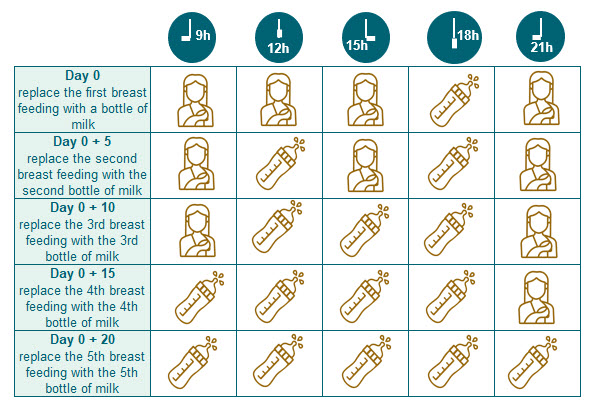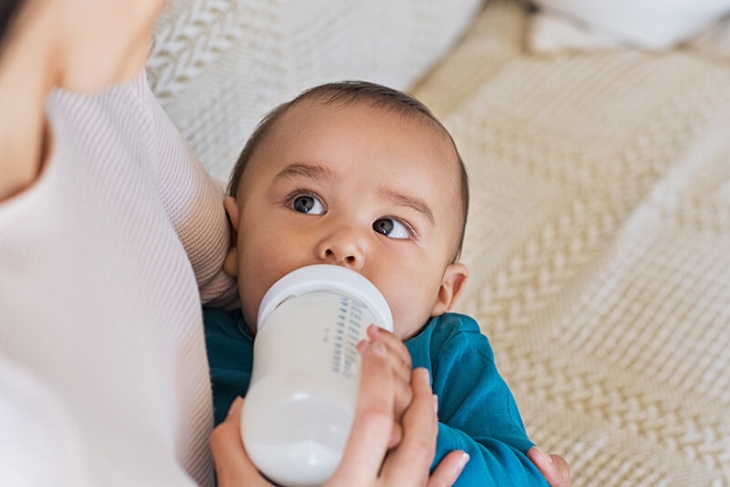Weaning: being well prepared, 6 tips to make things easier
Overview
Breast milk is the ideal food for babies, and WHO recommends that babies should be exclusively breastfed up to the age of 6 months. But you might want or need to stop breastfeeding and switch to bottles. And this major weaning step is not always easy... for either you or your baby! So here are our top tips to help you cope as well as possible.
1. Approach this milestone gently and at baby’s own pace
Above all, don’t rush or make sudden changes! It’s important to take things gradually.
Don’t force yourself: if you don't feel ready to wean your baby right away, but need to go back to work for example, you can express your milk (if your nursery or child minder agrees) or switch to mixed feeding. The aim is to find the right balance for you.
And since this is a small upheaval in your baby's life, be sure to continue to behave in your usual way otherwise. Even if you are no longer nursing your baby, continue to give him little kisses and talk gently as before.
If you have any doubts or questions, get in touch with your doctor or paediatrician. They will be able to help you through this important step.
2. Follow a feeding timetable and be prepared
Try to get your baby used to the bottle before you start weaning: offer him your own expressed milk in a bottle from time to time so he gets a taste for the teat. If you have to wean your baby because you are going back to work, be aware that it takes 2 to 3 weeks for him to get used to these new habits. Start by replacing the least “productive” feed of the day, often the one at the end of the afternoon, with a bottle of infant formula. Then wait 4 or 5 days before replacing the second feed, and so on. For example:
✓ D Day: replace one feed
✓ D Day +5: replace 2 feeds
✓ D Day +10: replace 3 feed
✓ D Day +15: replace 4 feeds
✓ D Day +20: replace 5 feeds

Source : https://www.modilac.com/our-expertise/weaning/successful-weaning
3. Don't worry about minor setbacks
Your baby may push away the bottle. But don’t panic! Don’t insist and try again later. Otherwise, to encourage your baby, you could warm up the teat under hot water. It will remind her of how your breast feels. And don't worry if she skips a bottle, she will eat when she is hungry. Trust your baby, she will let you know. And don’t stress if her bowel habits change! It takes 8 to 10 days for your baby’s digestive system to adjust to changes.
4. Take care of yourself
Weaning isn’t only an upheaval for your baby. It is for you too. Your milk production will gradually reduce but that can take time and your breasts may feel hard and painful.
To relieve pain, take some time to massage your breasts using circular movements. And if they really are too engorged, you could try to empty them a little by gently pressing them under warm water in the shower or by dipping your nipple in a glass of warm water. (Be careful not to burn yourself!) However, we recommend that you avoid using a breast pump, which would stimulate milk production.
Finally, if you are finding this period difficult, don't hesitate to talk about it to the people around you: to your baby’s dad, to your friends, to your mum (yes, she has been there too!), to other mums, or even to professionals (doctor, midwife, psychologist, etc.). Don’t forget: Happy mums make for happy babies!
5. Get Dad involved
If you aren’t a single mum, you have Dad to help and weaning is the ideal time for him to bond more with baby. And what a joy it is to see them share this moment together. In fact, it's a good idea for Dad to give the bottle. Baby will wonder less why he’s no longer allowed to breastfeed.
6. Choose your infant formula carefully
The best thing to do is to ask your doctor for advice and he or she will be able to guide you towards the best formula for your baby. For example, Doucéa 2nd-stage infant formula is good for several reasons:
- It is the first formula in France to contain lactoferrin, the second most abundant protein in breast milk.
- It is made in France.
- It is palm oil free.
And, of course, it contains everything baby needs for healthy development, as required by the regulations.


